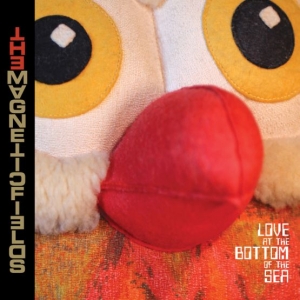[Illustration by ALEX FINE]
![]() BY MIKE WALSH The Magnetic Fields new CD, Love at the Bottom of the Sea, is similar in many ways to their previous nine records, and that’s a good thing. It’s got singer/songwriter Stephin Merritt’s playful rhymes and eccentric lyrics, his unabashed romanticism and instantly recognizable melodies, and his joy in toying with gender roles. As usual for the Magnetic Fields, the songs are short, averaging less than 2:30 each, have few instrumental breaks, and end abruptly. And there are several great songs of unrequited love and longing sung by Merritt in his deep, lovelorn voice — “The Only Boy in Town,” “Born for Love,” and “Andrew in Drag.” These pieces could find a place on any Magnetic Fields record.
BY MIKE WALSH The Magnetic Fields new CD, Love at the Bottom of the Sea, is similar in many ways to their previous nine records, and that’s a good thing. It’s got singer/songwriter Stephin Merritt’s playful rhymes and eccentric lyrics, his unabashed romanticism and instantly recognizable melodies, and his joy in toying with gender roles. As usual for the Magnetic Fields, the songs are short, averaging less than 2:30 each, have few instrumental breaks, and end abruptly. And there are several great songs of unrequited love and longing sung by Merritt in his deep, lovelorn voice — “The Only Boy in Town,” “Born for Love,” and “Andrew in Drag.” These pieces could find a place on any Magnetic Fields record.
In “Andrew in Drag”, which may be the best song on the record and has a charmingly unique video, a straight guy sings of his love for Andrew, but only when Andrew dresses in drag. To complicate matters, Andrew too is straight. “So stick him in a dress,” Merritt sings of this impossible situation, “and he’s the only boy I’d shag.” This record also features the return of synthesizers to the Magnetic Fields arrangements. Synths were prominent on the band’s 90’s records, but their three previous CDs were synth free. A few of the songs are truly machine-like 80’s electro-pop, like “God Wants Us to Wait” and “Infatuation (With Your Gyration).” Merritt is known for his large collection of rare synths, and on many pieces he builds the structure and rhythm on odd synthesizer sounds. The synth-based arrangements also show Merritt’s devotion to bands like ABBA, Kraftwerk, Roxy Music, New Order, Gary Numan, and the Human League.
But the first thing I noticed about Love at the Bottom of the Sea is the asexual vocals on several songs, including two of the first three. The voice evidently belongs to Shirley Sims, and it is impossible to distinguish as either male or female. This calls into question the sexual orientation of the characters, something that Merritt clearly intends. This voice threw me so much that I thought a couple Fountains of Wayne songs had mistakenly gotten mixed in with the record. Love at the Bottom of the Sea also contains several whimsical and light-hearted pieces where Merritt writes from a different persona. On “My Husband’s Pied-à-Terre,” for example, a housewife sings about the women of “every race, age, bra size, and IQ” that her husband brings to his pied-à-terre (a small apartment), where “love is in the very air.” For everyone except her, unfortunately. The song ends with her swearing to “do him in” when she gets out of “this loony bin.” I spoke with Stephin Merritt about the new Magnetic Fields record recently.
PHAWKER: The press release for this record points out that you returned to an earlier style of using synths on this new record, similar to your records from the 90s.
STEPHIN MERRITT: That’s not accurate. We have not returned to an earlier style. All the synthesizers used on the new record did not exist when we last used synthesizers, so they are actually a quite different style.
PHAWKER: What do you like about the new synthesizers?
STEPHIN MERRITT: The lack of a keyboard. I’ve been getting a lot of electronic instruments that have nothing to do with keyboards. Instead of playing tunes on them,  I allow them to behave as they want to behave, so they might sound like parrots in the jungle or that sort of thing–rather than sound like an electric organ, which is what most synthesizers sound like.
I allow them to behave as they want to behave, so they might sound like parrots in the jungle or that sort of thing–rather than sound like an electric organ, which is what most synthesizers sound like.
PHAWKER: You use synthesizers much differently than most bands. You don’t use them in a big rock way.
STEPHIN MERRITT: We don’t do much in a big rock way. Our last CD, Realism, is all acoustic instruments, but the one before that, Distortion, is mostly electric instruments except for the drums. Everything is electrified, repeating back, and wildly distorted. And the one before that, i, is a soft rock record, combining acoustic and electric instruments.
PHAWKER: Every song title on that record starts with the letter “I”. Do you enjoy imposing rules or parameters on your recordings, like using synths or not using synths?
STEPHIN MERRITT: I think everyone does that. We just keep changing the rules between albums rather than using the same rules. The Rolling Stones don’t change the rules between albums. We do.
PHAWKER: The new record seems more humorous than some of your previous work. It’s clever and funny.
STEPHIN MERRITT: Thank you.
PHAWKER: Do you see it that way?
STEPHIN MERRITT: I find them all to be clever and funny. I’m not aware of being more or less humorous on this record. But maybe I’m not the right one to ask.
PHAWKER: For example, the threat of violence on “Your Girlfriend’s Face” is way over the top. A jilted lover hires a hit man to “blow off your girlfriend’s face” and then have the ex-lover “buried alive on crystal meth.”
STEPHIN MERRITT: It certainly wouldn’t be funny if you were in that situation, but from the outside it seems funny.
PHAWKER: “I’d Go Anywhere with Hugh” has a Who’s on Third love triangle that cracks me up. Each of the three loves one of the other two, who loves the third, so no one finds love.
STEPHIN MERRITT: It’s probably the fact that one of them named Hugh that makes it funny.
PHAWKER: “The Horrible Party” is another amusing song. I suppose that’s a universal situation.
STEPHIN MERRITT: The only thing that’s really horrible is that they run out of champagne. And we don’t know what the plastic surgeon has done to Jane, but it made her very popular.
PHAWKER: This record seems more whimsical, less personal, and less painful for your characters. On 69 Love Songs, for example, the narrator suffers frequently from lost or unrequited love.
STEPHIN MERRITT: Well, at least he wasn’t buried alive. I like drama and over-the-top melodrama. “My Girlfriend’s Face” is autobiographical, not that I actually hired an assassin, but I had that exact revenge fantasy. I changed the gender around, but the rest is my actual revenge fantasy.
PHAWKER: In “God Wants Us to Wait,” the object of lust in a nude teenage make-out session won’t go all the way. I immediately thought of Rick Santorum and what he’s been saying about the evils of birth control.
STEPHIN MERRITT: I make no effort to be timely. Between the time I recorded Distortion and when it came out, the word “twitter” came to mean something completely different. But it was an accidental timeliness. I didn’t actually like it. Twitter almost ruined the song, and it’s hard to hear it now.
PHAWKER: At the end of the documentary Strange Powers, you move to LA. Are you still living there?
STEPHIN MERRITT: Like any documentary, it vastly over-simplifies the lives of the people involved. I moved my studio to LA, but I kept an apartment in New York, which they left out of the movie. So I just go back and forth all the time.
PHAWKER: The rest of the band was living in the east at the time, right?
 STEPHIN MERRITT: It depends who you mean. We have two or three and members who live in San Francisco, and one in Boston, and two in Brooklyn. And I shuttle back and forth between Hollywood and Manhattan. The documentary over-simplifies the chronology as well, because it shows us recording Distortion when I was supposedly living in NY, but we recorded that after I moved to LA.
STEPHIN MERRITT: It depends who you mean. We have two or three and members who live in San Francisco, and one in Boston, and two in Brooklyn. And I shuttle back and forth between Hollywood and Manhattan. The documentary over-simplifies the chronology as well, because it shows us recording Distortion when I was supposedly living in NY, but we recorded that after I moved to LA.
PHAWKER: Jeff Magnum, who is curating the All Tomorrow’s Parties music festival this year, invited the Magnetic Fields to appear. Are you excited about that?
STEPHIN MERRITT: No. We don’t usually play festivals, and there are good reasons for that. But they’ve assured us that those reasons would be neutralized.
PHAWKER: Why don’t you normally play festivals?
STEPHIN MERRITT: The last festival we played was in Denmark. We were playing in a tent at like noon. In the next tent was Queens of the Stone Age, which, if you aren’t familiar with them, are a loud heavy metal band. And they have the busiest drummer in the world. I actually thought they had two drummers, but it’s only one. Of course, we have no drummer at all, and our motto is, “If it’s too quiet, you’re too young.” So it was impossible for us to be heard properly, even on stage. If it happens again, I think we’ll sue.
PHAWKER: Why do you prefer to play quietly?
STEPHIN MERRITT: There are many reasons to play quietly, one of which is to save one’s hearing and the audience’s hearing. There’s no reason to play loudly.
PHAWKER: How is your pet Chihuahua Irving these days?
STEPHIN MERRITT: He’s had a lot of inverted trachea problems recently. Little dogs make a horrible noise when they’ve got that, and you think they’re going to die, but they’re not going to die. It’s just a bad sound. It’s like the hiccups.
PHAWKER: Does he go on tour with you?
STEPHIN MERRITT: Not anymore.
PHAWKER: Anything else you’d like to tell your fans about the new record?
STEPHIN MERRITT: When we play live, we don’t sound anything like we sound on the record – deliberately.
PHAWKER: Will you be playing synthesizers live during the show?
STEPHIN MERRITT: No. I’ll be playing kazoo.
PHAWKER: Well, thanks. I hope you enjoy the tour.
STEPHIN MERRITT: I never enjoy the tour.

